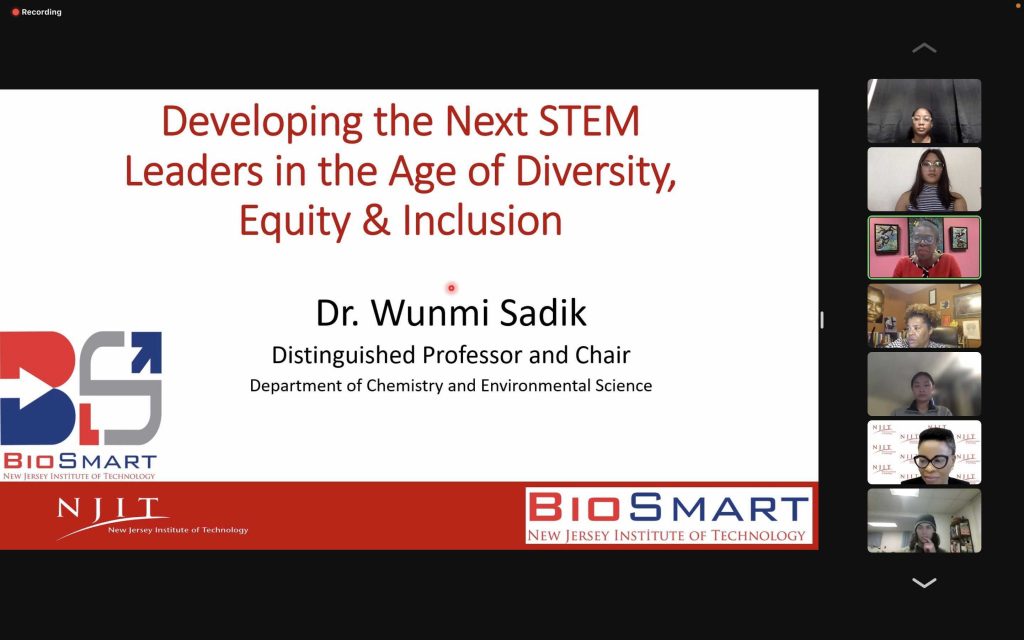Wunmi Sadik, distinguished professor and chair in the New Jersey Institute of Technology’s department of chemistry and environmental sciences, visited Binghamton University this past Thursday.
Around 60 people attended Sadik’s talk over Zoom, titled “Developing the Next STEM Leaders in the Age of Diversity, Equity and Inclusion.” Sadik is the first speaker in this year’s Harriet Tubman Center for Freedom and Equity annual speaker series, the theme being “Rethinking the Future: Lessons from the [COVID-19] Era.” Anne Bailey, co-director of the Tubman Center and professor of history, and Sharon Bryant, associate dean of diversity, equity and inclusion for Decker College of Nursing and Health Sciences, began the event by thanking the organizations involved in this year’s speaker series.
Sadik’s connection to the University extends beyond her visit as a guest speaker, as she spent 22 years of her academic career at BU. Sadik has also been recognized for her research in biosensors and sustainable technology, holds six U.S. patents and has published over 200 peer-reviewed scientific publications, according to Bailey.
Throughout her talk, Sadik utilized the scientific method to examine the question of systemic racism in the scientific workforce, defined diversity, equity and inclusion, discussed how diversity could foster “better science” and discussed possible solutions that go beyond recognizing the problems identified in her investigation. Sadik cited different statistical theories and studies as she walked the audience through her investigation.
“It’s important that we develop this diverse workforce so that we can be competitive and retain our competitiveness,” Sadik said. “We need to nurture these coming generations, we need to set clear and specific goals, we need to follow these guidelines. Not just come up with policies and problems, we need to really not pay just lip service to some of these things.”
John Mancusi, a senior double-majoring in business administration and history, wrote that Sadik’s talk had “struck a chord.”
“My older sister is a BU [alumna] and getting her Ph.D. in cancer biology right now,” Mancusi wrote in an email. “Hearing how some groups are marginalized within the [science, technology, engineering and mathematics (STEM)] community is disheartening, but having talks like this is encouraging. The talk was very interesting and Dr. Sadik had tons of statistics and facts to back up her information. At one point, I believe she said there is only one Black chemistry professor in England, which is a little nuts. Again, talks like this are great because if I ever do dabble in STEM recruiting or hiring, I will be sure to understand the nuances and complexities around [diversity, equity and inclusion (DEI)] in STEM.”
Some other problems that surfaced throughout Sadik’s investigation included the inequities in hiring, promotions, publications and research funding. Sadik also discussed DEI solutions in STEM, including in primary education.
Matthew Johnson, an attendee and director of clinical training and professor of psychology, wrote that Sadik made a strong case for the presence of systemic racism in STEM.
“I appreciated the way she presented data and contextualized the data to help us understand the implications of the data,” Johnson wrote in an email. “She described how systemic racism and sexism in STEM has costs for the nation and world.”
Sadik described a particular issue in DEI in STEM by telling the audience an anecdote a female student’s college experience, where the student had felt she was not expected to do well. Afterward, Sadik said it was important to find solutions to such problems.
“We need to be aware because we don’t know who these students are going to be in the future,” Sadik said. “And they could be the ones to save us, or save our family members. Anybody could have some disease that there are no solutions to, and who knows if these people are going to be the ones that discover them.”
When talking about the future, Sadik also said a diverse STEM leadership and workforce will be imperative for future generations’ success.
“According to the latest Census Bureau projections, minorities will account for 56 percent of the U.S. population by 2060,” Sadik said. “This is the projected number of Hispanics, Asians and persons of multiple races. What can we do to harness these important resources? What are we going to do to better utilize the diverse thinking that is resonant in these groups? If we keep excluding them, we’re excluding the next solution. We’re excluding the social well-being. We’re excluding the economic well-being.”
Students and faculty were invited to attend the two remaining talks in the series: “Lessons from the Past and Present: Policing in the Age of COVID” with Leslie Alexander, an associate professor of African and African American studies in Arizona State University, and “Building Anew: Constructing the Future Paradigms of Race and Food” with Henry Obispo, social-entrepreneur and founder of ReBORN FARMS and Born Juice.



